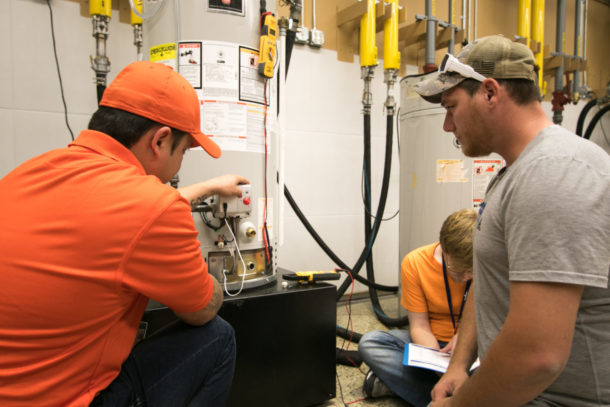Skilled Careers Coalition Unites Industry, Educators, Policymakers and Parents on Need to Work Together to Inspire Youth, Skilled Trades, Engage Mentors, and Disrupt Dated Recruitment Practices Skilled Careers Coalition Unites Industry, Educators, Policymakers and Parents on Need to Work Together to Inspire Youth, Skilled Trades, Engage Mentors, and Disrupt Dated Recruitment PracticesConversation and Content Yield Read more
Workforce

Skilled Careers Coalition Unites Industry, Educators, Policymakers and Parents on Need to Work Together to Inspire Youth, Skilled Trades, Engage Mentors, and Disrupt Dated Recruitment Practices
Table of Contents
Skilled Careers Coalition (SCC), the fast-growing, big-tent alliance, is spearheading collaboration and breaking down silos within the highly fragmented skilled trades to encourage cross-industry support of a common goal to close the skilled labor gap.
Said Mark Hedstrom, Executive Director, Skilled Careers Coalition, “We have reached a crossroads as a nation. The skilled trades are the backbone of America’s economic engine, but the widening skilled labor gap – at a time when demand is growing at a rapid rate – could cripple entire industries if we don’t come together to rebuild the great American workforce. We have an obligation to roll up our sleeves to elevate and promote the skilled trades as a third path to career success.”
To meet the moment, SCC has steadily assembled a robust community of cross-sector stakeholders that includes businesses, educators, pros, policymakers, parents and youth.

Conversation and Content Yield Consensus and Inspiration
Against the backdrop of the SkillsUSA National Leadership & Skills Conference held in Atlanta, GA on June 23-27, 2025, SCC engaged with more than 100 leading businesses and organizations and thousands of students and advisors around three critical areas: inspiring youth by meeting them where they are on social media; encouraging more skilled pros to become actively involved as mentors and teachers; and bringing recruitment efforts up-to-date with technologies that streamline the hiring process.
During the week-long series of activities, SCC hosted student-led panels, shared round-the-clock content on social media, presented a ‘state of the skilled trades’ gathering for leading business and education sector leadership, and brought television personality Ty Pennington back for the second year in a row to reprise his role as host and mentor of the third season of SCC’s for-youth, by-youth YouTube series SKILLS JAM.
Further catalyzing efforts was SCC’s facilitation of remarks from federal, state and local policymakers including the Secretary of the U.S. Department of Labor Lori Chavez-DeRemer and Congressman Rick Allen (Georgia, District 12), who shared their commitment to addressing the skilled labor gap via video; and Senator Raphael Warnock and Congresswoman Lucy McBath (Georgia, District 6) who sent staff members to the high-level gathering to listen and learn.
The coalescence of the industry’s leading voices achieved over the week’s events was a big step forward by SCC in realizing its mission to bring unity to the skilled trades and ultimately, help reverse the rising rate at which demand for skilled talent is outpacing supply.
By forging new pathways to engage and recruit talent using social media and technology, advocating for workforce readiness education opportunities such as apprenticeships; and encouraging the intergenerational transfer of knowledge and experience, the skilled trades can meet the opportunities that lie ahead.
Background
Skilled Careers Coalition conducted the Skilled Trade Insight Research Study in 2023 which surveyed parents, guidance counselors and students. The study found that a lack of knowledge, not interest, keeps young people from pursuing skilled careers. In fact, 43% of students surveyed said they would consider a skilled career if they had more information and guidance. With 65+ million youth between the ages of 10-24 in the U.S. and millions more working age adults out of the workforce, we need to organize and mobilize, across all sectors, to inspire and engage.
Skilled Careers Coalition (SCC) is on a mission to bring the youth of today to the skilled careers of tomorrow by revolutionizing this critical part of the American workforce. A dramatic paradigm shift is taking place in both employment and education. With industries and organizations operating in silos, SCC is driving the connectivity needed between parents, skilled trade professionals, youth, educators, policymakers, businesses, and brands to build a dynamic ecosystem that harnesses the talent needed to close the widening skills gap. To inspire, mentor and empower students to navigate the skilled careers landscape, Skilled Careers Coalition launched the social entertainment brand, SKILLS JAM in 2023. For more information or to get involved visit https://skilledcareers.org.

Like any other industry, plumbing relies heavily on efficiency. While this may be a relatively easy issue to manage when you are a one or two-person venture, it becomes far harder for large teams. Not least because you will have a combination of permanent and temporary employees spread out across multiple sites. If you fail Read more
Like any other industry, plumbing relies heavily on efficiency. While this may be a relatively easy issue to manage when you are a one or two-person venture, it becomes far harder for large teams. Not least because you will have a combination of permanent and temporary employees spread out across multiple sites. If you fail to give this aspect the attention it deserves, things can quickly spiral out of control.
However, plumbing companies can regain control by putting the right strategies in place. Here are some of the most effective solutions that can be used regardless of whether you focus on B2B, B2C, or both.

Manage Timesheets More Effectively
All contractors and employees deserve to be paid fairly. However, you can not allow people to take liberties by charging for hours when they are not working. Using an all-in-one time tracking system to manage your teams across all sites is highly advised. When integrated with payroll, people can get paid quicker, which will make them happier. Better still, you will save time and money on this aspect of admin.
Moreover, it becomes easier to know where the company stands financially. Not least because you’ll remove errors while simultaneously having access to updated data.
Manage Your Fleet
Virtually all plumbing companies provide a mobile service. Efficient journeys are an essential part of the process as they allow your team to complete more jobs. Using fleet management software ensures that the right workers are dispatched to the right jobs. Moreover, you can check their routes and even factor in traffic jams and other issues. Companies become more efficient while workers and clients have an extra reason to be happy.
It is a particularly important step for companies with a nationwide or multi-state presence. However, even smaller local plumbing firms will see significant benefits.
Ensure That Workers Have The Right Tools
Using the right tools and equipment enables plumbers to do their jobs more efficiently. This translates to increased speeds and accuracy, thus providing a platform for greater success. A next gen stud finder, for example, can streamline this part of the process. Similarly, a variety of tools can be used to identify and diagnose problems quickly. In turn, plumbers can get to work on the solution to those issues.
Having trusty handheld tools is equally crucial. Aside from allowing plumbers to work faster, they can complete the job correctly. This reduces free callouts to repair mistakes.
Improve Your Financial Spending
Finally, you should never overlook the need to keep an eye on overheads as well as revenue. From efficient ad campaigns that gain better ROIs to changing telecom providers, many upgrades can be made. It is vital that you review all expenses on a regular basis to identify areas of improvement. Any opportunity to save money without compromising on the quality of your output should be taken.
It boosts your profit margins per client as well as your break-even point. In turn, this will lift a weight of stress from your shoulders and give the whole venture a better chance to thrive.
A new report from the Brookings Institution provides a detailed and data-driven look at careers in the water sector, finding that while there are looming shortages and a need for diversity in the workforce, water jobs are a tremendous economic opportunity for the American worker. The Water Environment Federation encourages its members to closely review Renewing Read more
A new report from the Brookings Institution provides a detailed and data-driven look at careers in the water sector, finding that while there are looming shortages and a need for diversity in the workforce, water jobs are a tremendous economic opportunity for the American worker.
The Water Environment Federation encourages its members to closely review Renewing the Water Workforce: Improving water infrastructure and creating a pipeline to opportunity, which was released June 14.
“The report reveals the sizable economic opportunity offered by water jobs, including the variety of occupations found across the country, the equitable wages paid, the lower educational barriers to entry, and the need for more diverse, young talent,” write authors Joe Kane and Adie Tomer of the Brookings Institution.
Kane and Tomer examined occupational employment data and made several key findings:
- In 2016, nearly 1.7 million workers were directly involved in designing, constructing, operating, and governing U.S. water infrastructure, spanning a variety of industries and regions.
- Water occupations not only tend to pay more on average compared to all occupations nationally, but also pay up to 50 percent more to workers at lower ends of the income scale.
- Most water workers have less formal education, including 53 percent having a high school diploma or less. Instead, they require more extensive on-the-job training and familiarity with a variety of tools and technologies.
- Water workers tend to be older and lack gender and racial diversity in certain occupations; in 2016, nearly 85 percent of them were male and two-thirds were white, pointing to a need for younger, more diverse talent.
“While the Water Environment Federation and our colleagues across the water sector have long been aware of the challenges and opportunities of our workforce, we are grateful that the Brookings Institution produced this timely, detailed report that contains fresh data,” said Eileen O’Neill, WEF Executive Director. “It is imperative on all of us to examine the findings and accelerate our efforts to ensure a sustainable and talented water workforce.”
This spring WEF nationally launched a jobs program that provides training and certification in the field of green infrastructure. The National Green Infrastructure Certification Program (NGICP) establishes national requirements for working on green infrastructure projects, promotes a skilled green workforce, streamlines the process of connecting qualified talent to in-demand jobs, and supports community-based job creation in U.S. cities. NGICP is working with local organizations to expand the program nationally, including partnering with community colleges and STEM high schools to incorporate the curriculum into educational institutions and member associations to engage existing infrastructure workers. NGICP is also partnering with workforce development organizations to engage many of the chronically un- and under-employed in urban areas across the country.
WEF also maintains the Job Bank, continually updated site with new employment listings for careers in wastewater, including water and wastewater management, operations, consulting engineering, and other career paths in water quality. Visit the Job Bank.
To read the Brookings report visit: https://brook.gs/2HCBFdj
